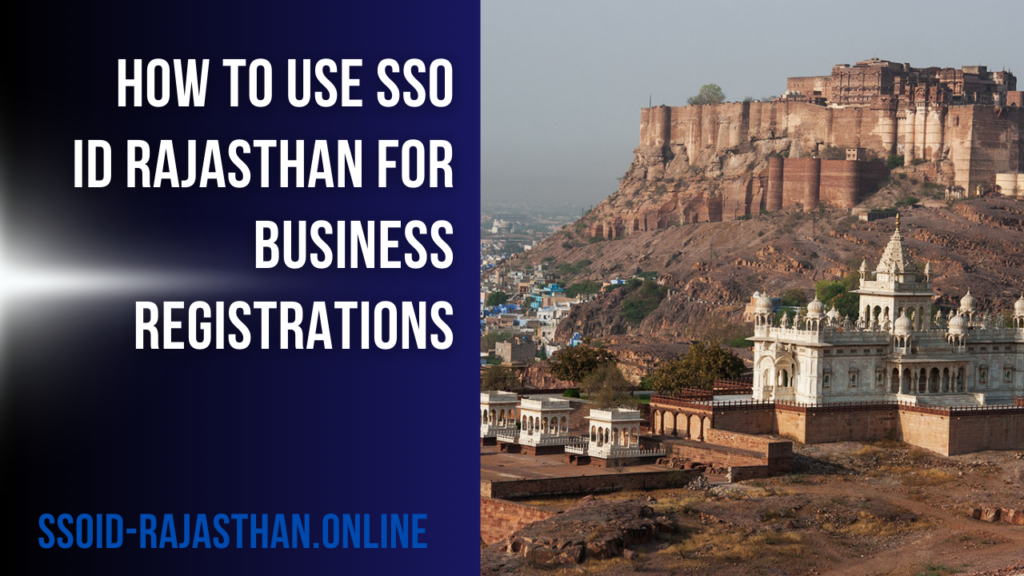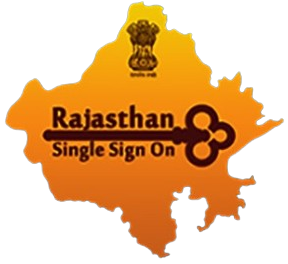SSO ID Rajasthan for Business Registrations has significantly transformed the landscape of digital governance in the state. Originally designed to simplify access to various government services, this system now extends its benefits to the business community, making the process of business registrations more streamlined and efficient.

In the ever-evolving landscape of digital governance, Rajasthan has taken a significant leap forward with its Single Sign-On (SSO) ID system. Originally designed to simplify access to various government services, SSO ID Rajasthan now extends its benefits to the business community, making the process of business registrations more streamlined and efficient.
This comprehensive system allows entrepreneurs to register their businesses, apply for licenses, and access multiple services through a single platform. By centralizing user authentication and improving data management, SSO ID Rajasthan enhances security, saves time, and reduces administrative burdens, thus promoting a more business-friendly environment in the state.
Understanding SSO ID Rajasthan
SSO ID Rajasthan is a unified digital identity system that allows individuals and businesses to access multiple government services with a single set of login credentials. The system simplifies the user experience by eliminating the need for multiple usernames and passwords, thereby enhancing accessibility and security.
Benefits of SSO ID Rajasthan for Business Registrations
Streamlined Registration Process
One of the primary benefits of using SSO ID for business registrations is the streamlined process it offers. Business owners can register their enterprises, apply for licenses, and access various services through a single platform. This reduces the administrative burden and saves time, allowing entrepreneurs to focus on their core business activities.
Enhanced User Experience
The integration of SSO ID with business registration services significantly improves the user experience. The unified interface is easy to navigate, even for those who are not tech-savvy. This improved usability encourages more businesses to engage with digital platforms, fostering a culture of digital literacy.
Improved Security and Data Management
By centralizing user authentication, SSO ID enhances security measures. It reduces the risk of password-related vulnerabilities and allows for more robust security protocols. Additionally, it simplifies data management for both businesses and the government. Sensitive information can be securely stored and accessed, ensuring data integrity and confidentiality.
Time and Cost Efficiency
The SSO ID system saves time for business owners by allowing them to access multiple services without repeatedly entering their details. Government departments can process applications more efficiently due to centralized data, leading to reduced paperwork and administrative overhead. This efficiency translates to cost savings for both businesses and the government.
Real-time Updates and Notifications
Businesses can receive real-time updates and notifications through the SSO ID system. This includes alerts about the status of applications, upcoming deadlines, and new regulations. Timely communication enhances transparency and helps businesses stay informed, reducing the risk of non-compliance.
Trade-offs and Challenges
While SSO ID Rajasthan offers numerous benefits for business registrations, it also presents several challenges and trade-offs that need to be considered.
Balancing Security and Convenience
An inherent trade-off in any SSO system is the balance between security and convenience. While a single login simplifies access, it also means that if compromised, an attacker could potentially gain access to multiple services. Striking the right balance between user-friendliness and robust security measures is crucial.
Implementing additional security features like biometric authentication or risk-based authentication can enhance security. However, these measures must be implemented thoughtfully to avoid compromising the system’s ease of use.
Digital Literacy and Accessibility
The varying levels of digital literacy among business owners pose a challenge. While the SSO ID system simplifies access for tech-savvy users, it may pose difficulties for those less familiar with digital platforms. This digital divide could potentially marginalize certain segments of the business community, particularly in rural areas where internet access and computer literacy might be limited.
To mitigate this issue, the government has established training programs and help desks. However, ensuring widespread digital literacy remains an ongoing challenge. Continuous investment in digital education initiatives is essential to ensure inclusivity.
Technical Infrastructure and Reliability
The success of the SSO ID system heavily relies on robust technical infrastructure. Issues such as server downtime, slow internet speeds, or system glitches can significantly impact service delivery. During peak usage times, the system may face increased load, potentially leading to slowdowns or temporary inaccessibility.
Addressing this challenge requires continuous investment in IT infrastructure, regular system maintenance, and scalable solutions that can handle high traffic volumes. The government must also develop effective backup systems and disaster recovery plans to ensure service continuity.
Data Privacy and Security Concerns
Centralized data management through SSO ID enhances security in some aspects but also raises concerns about data privacy. With a single account holding a wealth of personal and business information, the potential impact of a data breach becomes more severe. Businesses may worry about the safety of their sensitive data and the potential for misuse.
To address these concerns, the government must implement state-of-the-art security measures, including encryption, multi-factor authentication, and regular security audits. Transparency about data handling practices and clear communication about security protocols are crucial to building and maintaining public trust.
Impact on Digital Governance and Business Efficiency
The integration of SSO ID Rajasthan for business registrations has a significant impact on digital governance and business efficiency.
Improved Efficiency in Government Operations
By centralizing user data and streamlining access to services, the SSO ID system has significantly improved the efficiency of government operations. Departments can process applications faster, reduce paperwork, and allocate resources more effectively. This efficiency benefits both businesses and the government.
Enhanced Transparency and Accountability
The digital nature of the SSO ID system enhances transparency in government services. Businesses can track the status of their applications and transactions in real-time, reducing opportunities for corruption and increasing accountability. This transparency helps build trust between businesses and the government.
Data-Driven Decision Making
The centralized system allows for better data collection and analysis. The government can gain insights into service usage patterns, identify areas for improvement, and make data-driven decisions to enhance service delivery. This data-centric approach can lead to more targeted and effective governance.
Bridging the Urban-Rural Divide
While challenges remain, the SSO ID system has the potential to bridge the urban-rural divide in access to government services. By providing a digital platform accessible from anywhere, it reduces the need for business owners to travel to government offices, particularly benefiting those in remote areas.
Promoting Digital Literacy and Inclusion
The implementation of the SSO ID system has indirectly promoted digital literacy in the state. As more services become available online, there’s an increased incentive for businesses to become digitally literate. This push towards digital adoption can have far-reaching effects on the state’s overall development and economic growth.
Future Prospects and Potential Enhancements
As technology continues to evolve, there are several potential enhancements that could further improve the SSO ID system for business registrations:
Artificial Intelligence and Chatbots
Implementing AI-powered chatbots could provide instant support to business owners, guiding them through various services and addressing common queries. This could significantly reduce the load on human support staff and provide 24/7 assistance to businesses.
Blockchain for Enhanced Security
Incorporating blockchain technology could further enhance the security and transparency of transactions. It could provide an immutable record of all interactions, reducing the risk of fraud and improving audit trails.
Mobile-First Approach
Given the increasing prevalence of smartphones, developing a robust mobile application for accessing business registration services via SSO ID could further improve accessibility, especially in areas with limited computer access.
Integration with Emerging Technologies
Future iterations could integrate with emerging technologies like the Internet of Things (IoT) for smart business solutions or augmented reality (AR) for interactive guidance, further enhancing the user experience and service capabilities.
Personalized Service Recommendations
Implementing machine learning algorithms could enable the system to provide personalized service recommendations based on a user’s profile and past interactions, making the platform more user-centric and efficient.
Conclusion
The integration of SSO ID Rajasthan for business registrations represents a significant step towards digital governance and improved business efficiency. While it offers numerous benefits in terms of accessibility, efficiency, and transparency, it also presents challenges that require ongoing attention and resolution.
As the system continues to evolve, it’s crucial for the government to maintain a balance between leveraging technology for efficiency and ensuring inclusivity for all businesses. By addressing challenges related to digital literacy, infrastructure reliability, and data privacy, the SSO ID system can become an even more powerful tool in bridging the gap between businesses and government services.
Ultimately, the success of this digital initiative will depend on continuous improvement, responsive governance, and a commitment to digital inclusion. As Rajasthan moves forward with its digital transformation, the integration of SSO ID for business registrations serves as a model for other states and countries looking to enhance their e-governance capabilities.
What is SSO ID Rajasthan and how does it help with business registrations?
SSO ID Rajasthan is a unified digital identity system introduced by the Government of Rajasthan. It simplifies the process of accessing various government services, including business registrations, by allowing users to log in with a single set of credentials. This streamlines the registration process, reducing the need to manage multiple accounts and passwords.
How can I register my business using SSO ID Rajasthan?
To register your business using SSO ID Rajasthan, you first need to create an SSO ID account on the official SSO Rajasthan portal. Once logged in, navigate to the business registration section, fill out the required forms, upload necessary documents, and submit your application online. The system guides you through each step, ensuring a smooth registration process.
What are the benefits of using SSO ID Rajasthan for business registrations?
Using SSO ID Rajasthan for business registrations offers several benefits, including streamlined access to various government services, enhanced security through centralized authentication, reduced paperwork, and efficient document management. It also provides real-time updates on the status of your application, making the process more transparent and user-friendly.
What documents are required for business registration via SSO ID Rajasthan?
The specific documents required for business registration via SSO ID Rajasthan can vary based on the type of business and its legal structure. Generally, you will need identification proofs, address proofs, and documents related to the business entity such as partnership agreements, incorporation certificates, and relevant licenses. The SSO portal provides detailed information on the required documentation during the application process.
Are there any challenges associated with using SSO ID Rajasthan for business registrations?
While SSO ID Rajasthan greatly simplifies the business registration process, there are some challenges. These include ensuring digital literacy among users, maintaining reliable internet connectivity, and addressing occasional technical glitches on the platform. Additionally, data privacy and security are ongoing concerns that the government continues to address through robust measures and regular updates.
